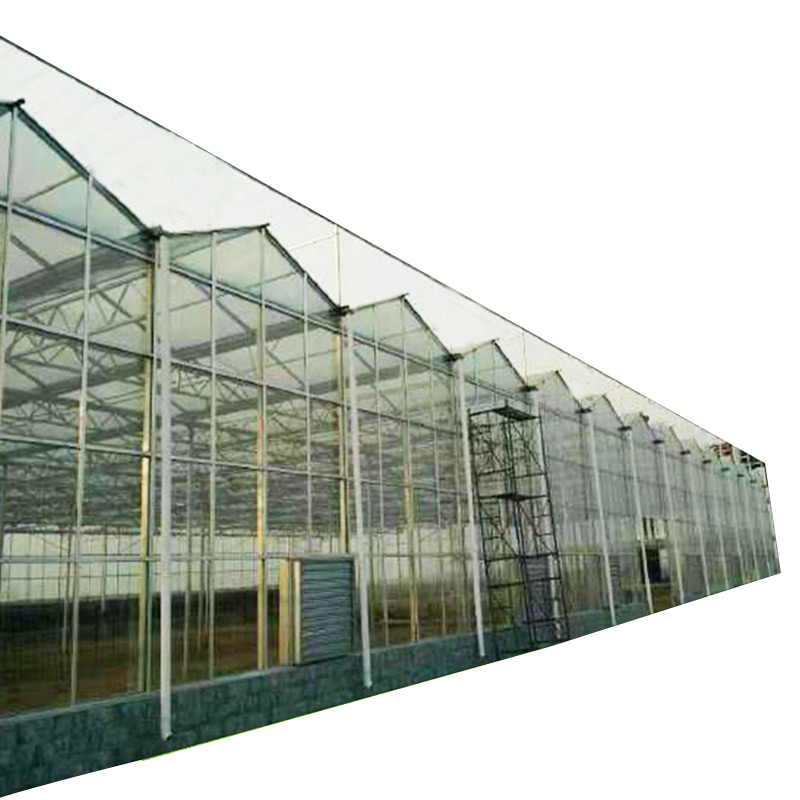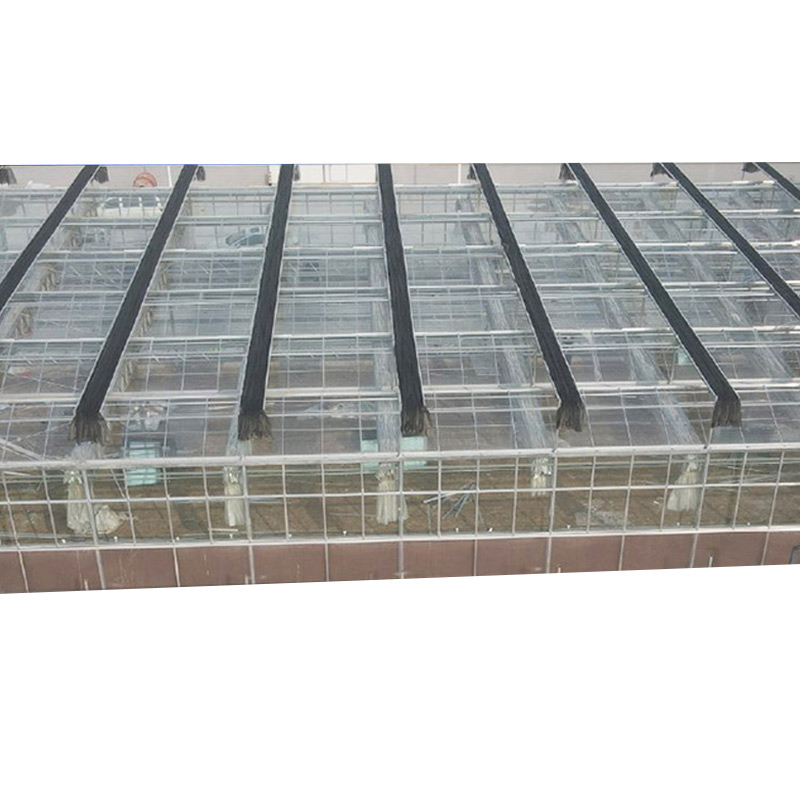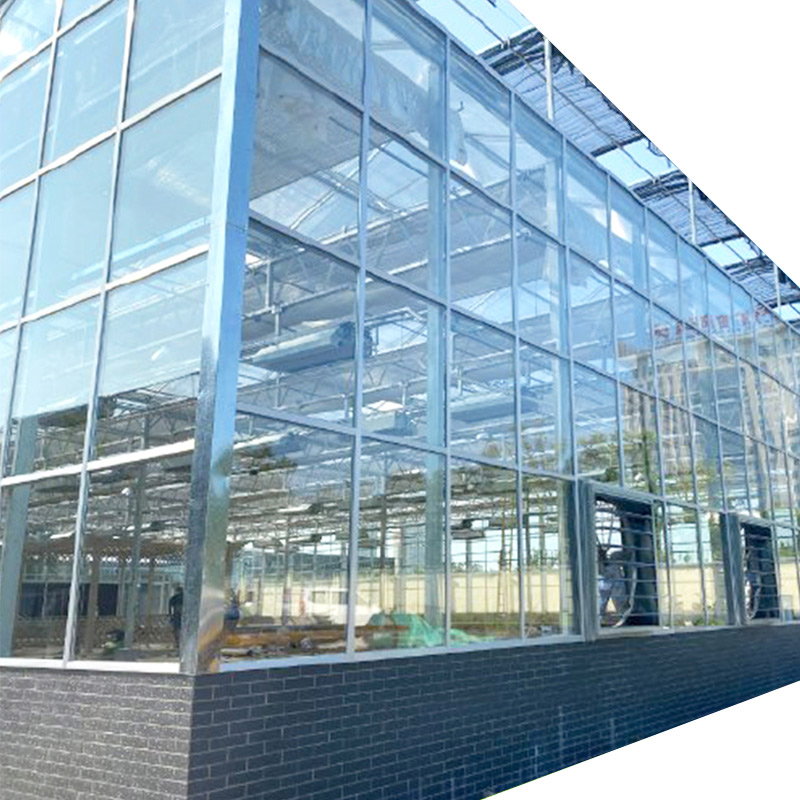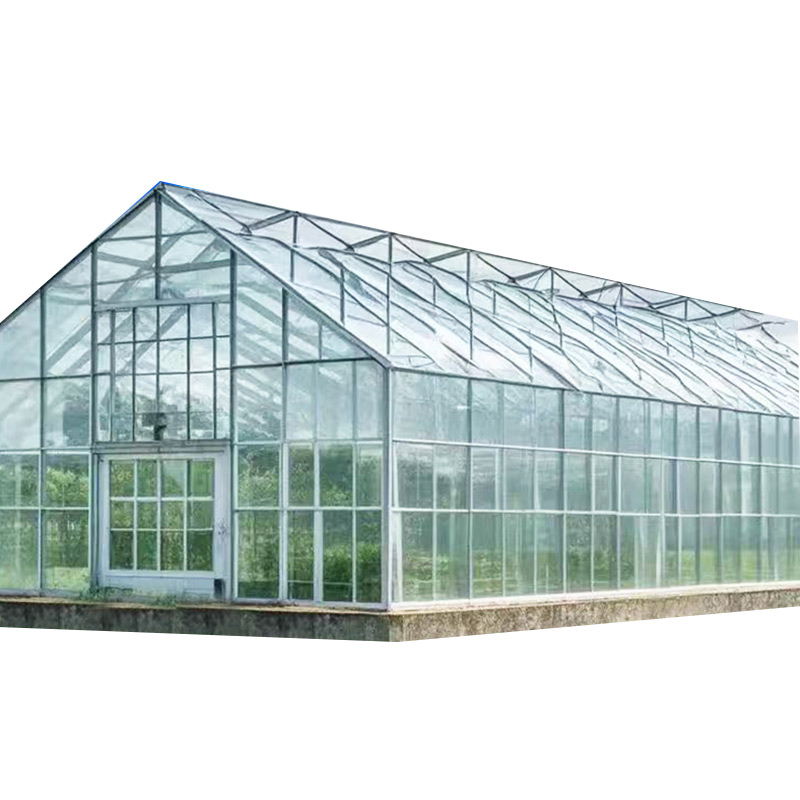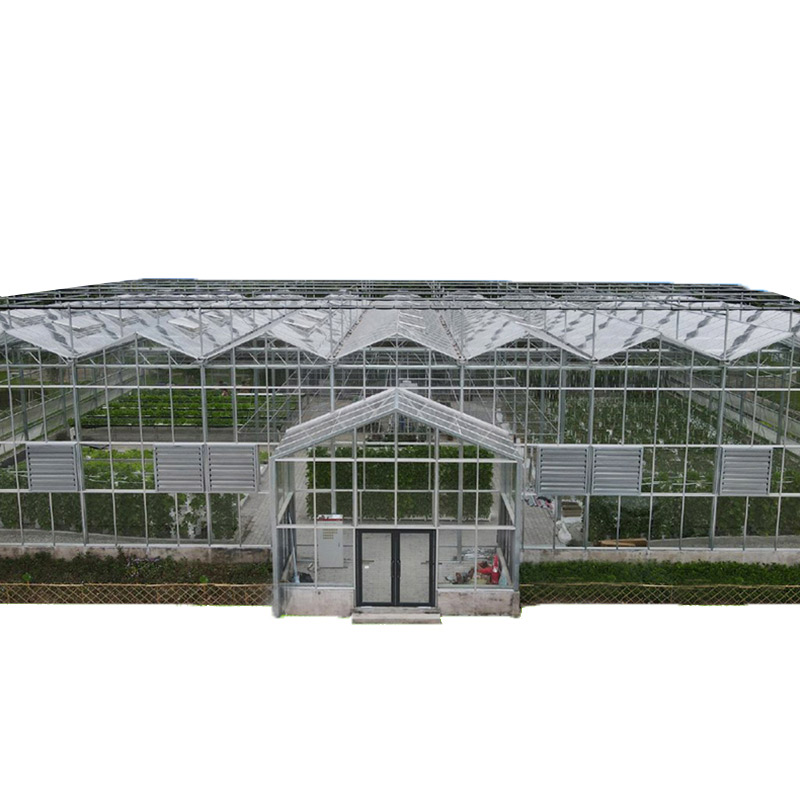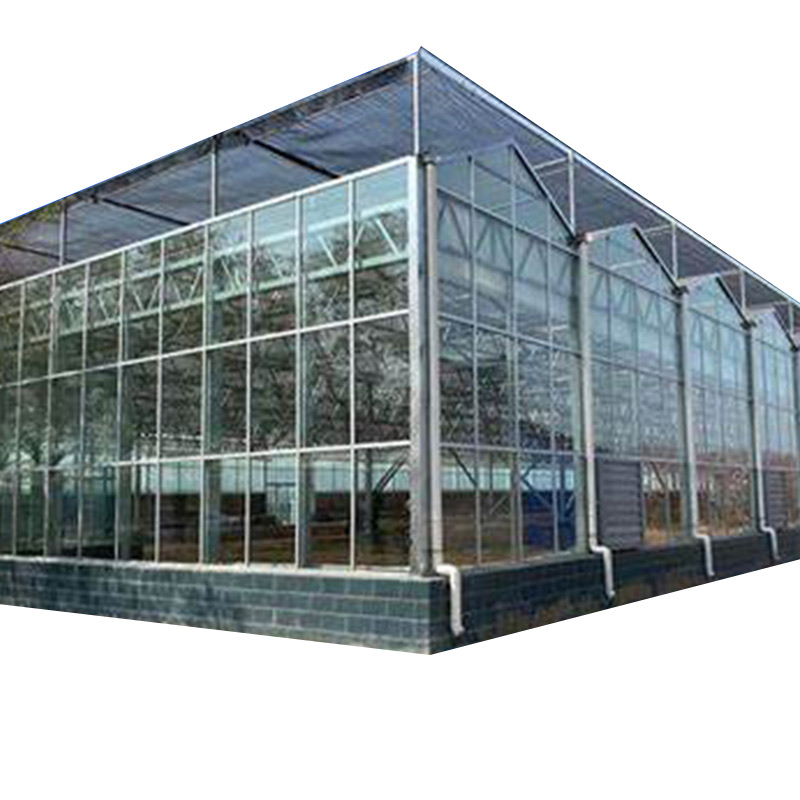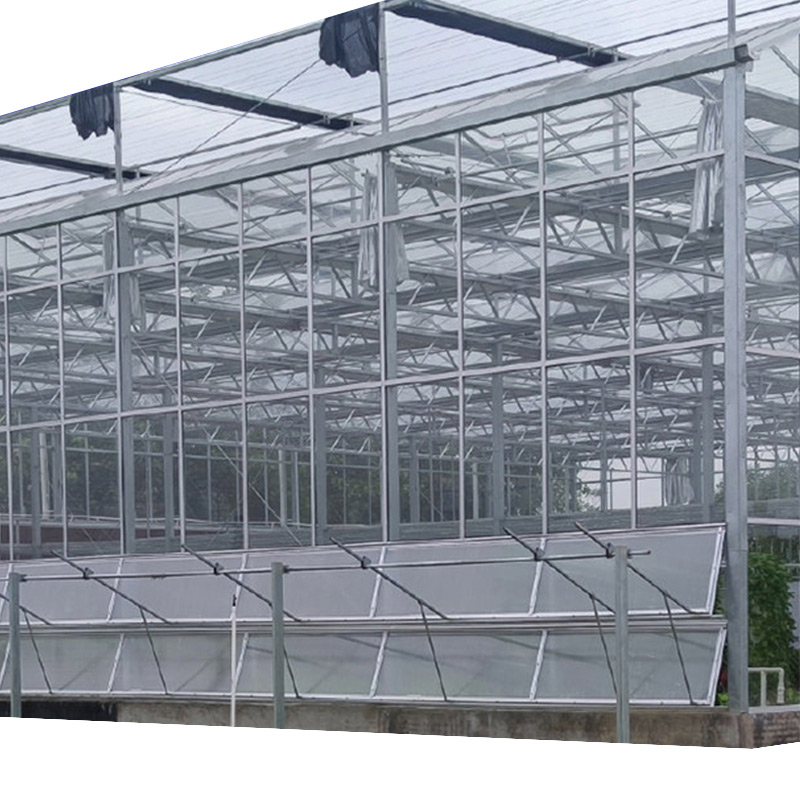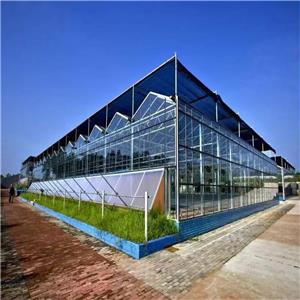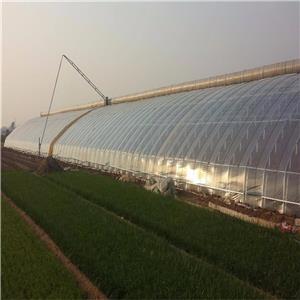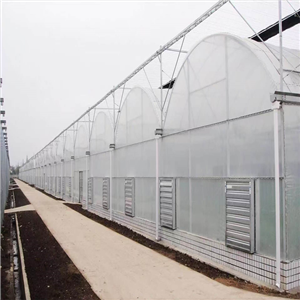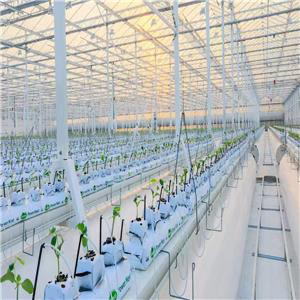
Multi-span glass greenhouse consists of multiple connected bays, forming a large, uninterrupted growing area. This design maximizes space efficiency, reduces construction costs, and improves thermal performance by minimizing external wall exposure. The structure typically uses tempered or laminated glass for high light transmission and durability.
Float glass greenhouse is constructed using float glass, a high-quality, distortion-free glass produced by floating molten glass on a bed of molten tin. This results in exceptional clarity and uniform thickness, optimizing sunlight diffusion for plant growth.
Multi-span Compact Hollow Float Glass Greenhouse
1. Introduction of multi-span glass greenhouse and float glass greenhouse
The Multi-Span Compact Hollow Float Glass Greenhouse represents a revolutionary advancement in modern horticultural infrastructure. Combining the space efficiency of multi-span design with the superior optical and thermal properties of hollow float glass, this greenhouse system offers unmatched performance for commercial growers, research institutions, and urban farming initiatives.
This 3000-word guide provides an in-depth exploration of its design principles, technological features, operational benefits, and practical applications in contemporary agriculture.
2. Structural Design and Materials of multi-span glass greenhouse and float glass greenhouse
Multi-Span Architecture
The multi-span configuration connects multiple greenhouse bays under a single roof structure, offering several advantages:
Space Optimization: Eliminates unnecessary walls between sections, maximizing usable growing area
Structural Efficiency: Reduced material usage per square meter compared to standalone units
Climate Uniformity: Creates more stable environmental conditions across larger areas
Operational Convenience: Allows seamless movement of personnel and equipment
Typical spans range from 6-12 meters with gutter heights of 4-6 meters, balancing light penetration with operational space.
Hollow Float Glass Technology
The greenhouse utilizes specially engineered hollow float glass panels:
Construction: Two layers of float glass separated by a vacuum or inert gas cavity
Optical Properties: Maintains 90-92% light transmission while diffusing sunlight evenly
Thermal Performance: R-values up to 1.5, significantly better than single-pane alternatives
Durability: Resistant to thermal stress and impact damage
Condensation Control: Inner surface temperatures remain closer to ambient air temperature
Compared to traditional glass or polycarbonate, this solution provides superior insulation without compromising light quality.
Frame and Support Systems
The structural framework incorporates:
Galvanized Steel: Primary load-bearing components with 20-30 year corrosion resistance
Aluminum Alloys: For glazing bars and secondary structural elements
Thermal Breaks: Insulating spacers between metal components to prevent heat bridging
Modular Connections: Allows for future expansion or reconfiguration
3. Climate Control and Automation of multi-span glass greenhouse and float glass greenhouse
Temperature Regulation
An integrated system maintains optimal temperatures year-round:
Heating: Hydronic floor heating combined with overhead hot water pipes
Cooling: Pad-and-fan systems with optional adiabatic cooling
Thermal Screens: Automated retractable screens with varying shading percentages
Phase Change Materials: Some models incorporate PCMs in walls for thermal buffering
Humidity Management
Precision humidity control prevents disease while promoting growth:
High-Pressure Fogging: 5-10 micron droplets for gentle humidification
Dehumidification: Condensation on chilled surfaces or desiccant systems
Ventilation Control: Algorithm-driven vent opening strategies
Ventilation Systems
Dual-mode ventilation ensures proper air exchange:
Natural Ventilation: Continuous ridge vents with insect screens
Mechanical Ventilation: EC fans with variable speed control
Air Circulation: Horizontal airflow fans spaced every 15-20 meters
Lighting Solutions
Supplemental lighting enhances production:
LED Arrays: Custom spectra for different crop types
Light Movers: Optimize photon distribution
Dynamic Control: Adjusts intensity based on natural light levels
4. Energy Efficiency and Sustainability of multi-span glass greenhouse and float glass greenhouse
Insulation Properties
The hollow glass design provides:
U-value: 1.1-1.3 W/m²K (superior to double-pane glass)
Nighttime Heat Retention: Up to 30% better than conventional greenhouses
Reduced Condensation: Maintains clearer glazing for winter light transmission
Solar Energy Integration
Renewable energy solutions include:
Semi-Transparent PV: Integrated into roof sections
Thermal Collectors: Heat storage for winter use
Dynamic Shading: PV-integrated movable screens
Water Management
Closed-loop systems maximize efficiency:
Rainwater Harvesting: 80-90% of roof runoff captured
Condensate Recovery: Up to 5L/m²/day in humid conditions
Hydroponic Integration: Recirculating nutrient delivery
5. Applications and Benefits of multi-span glass greenhouse and float glass greenhouse
Commercial Agriculture
Vegetable Production: 20-30% higher yields than conventional designs
Floriculture: Superior flower quality due to optimized light diffusion
Nursery Operations: Uniform conditions for propagation
Research and Education
Controlled Environment Studies: Precise parameter manipulation
Plant Breeding: Stable conditions for genetic research
Educational Demonstrations: Showcase of sustainable technologies
Urban and Vertical Farming
Rooftop Installations: Compact footprint for city locations
Stacked Growing Systems: Integration with vertical farming tech
Local Food Production: Year-round harvests near population centers
6. Installation and Maintenance of multi-span glass greenhouse and float glass greenhouse
Construction Process
Site Preparation: Leveling and foundation work (2-4 weeks)
Structural Erection: Primary framework installation (3-6 weeks)
Glazing: Glass panel mounting (4-8 weeks)
Systems Integration: 2-4 weeks for full commissioning
Maintenance Requirements
Daily: System diagnostics checks
Weekly: Glass surface inspections
Monthly: Mechanical system servicing
Annual: Structural integrity assessment
7. Future Trends and Innovations of multi-span glass greenhouse and float glass greenhouse
Emerging technologies include:
Smart Glass: Electrochromic glazing for dynamic light control
AI Optimization: Machine learning for climate prediction
Carbon Capture: Integrated photosynthesis enhancement
Robotic Systems: Automated harvesting and maintenance
8. Conclusion of multi-span glass greenhouse and float glass greenhouse
The Multi-Span Compact Hollow Float Glass Greenhouse represents the pinnacle of modern protected agriculture technology. By combining space-efficient multi-span architecture with advanced hollow glass glazing, this system delivers unparalleled light quality, energy efficiency, and climate control precision.
As global agriculture faces increasing challenges from climate change and urbanization, this greenhouse solution offers a sustainable path forward - enabling higher yields, better resource efficiency, and year-round production in diverse environments. Its adaptability makes it equally valuable for commercial growers, research institutions, and urban farming initiatives seeking to push the boundaries of what's possible in controlled environment agriculture.
The integration of smart technologies and renewable energy systems positions this design as a future-proof investment that will continue to deliver value as agricultural technologies evolve in the coming decade.

